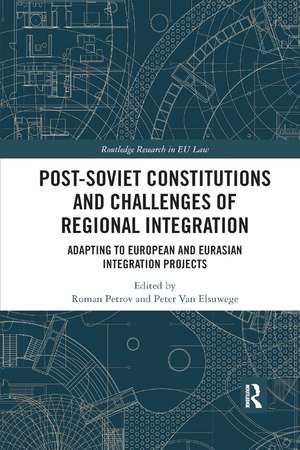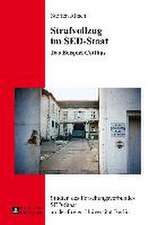Post-Soviet Constitutions and Challenges of Regional Integration: Adapting to European and Eurasian integration projects: Routledge Research in EU Law
Editat de Roman Petrov, Peter Van Elsuwegeen Limba Engleză Paperback – 12 dec 2019
The book addresses the relevant experience of the countries from Central and Eastern Europe with transitional constitutionalism, mapping out the significance of European and Eurasian integration for protecting the rule of law in the post-Soviet space and identifying the constitutional implications and challenges of the EAEU and the new generation of Association Agreements. It also provides detailed country reports on national constitutional orders in the post-Soviet space and their adaptability to regional integration projects, authored by leading academics from the countries concerned, providing a number of general reflections about the evolution of post-Soviet constitutions in light of European and Eurasian integration projects.
| Toate formatele și edițiile | Preț | Express |
|---|---|---|
| Paperback (1) | 389.66 lei 6-8 săpt. | |
| Taylor & Francis – 12 dec 2019 | 389.66 lei 6-8 săpt. | |
| Hardback (1) | 1001.84 lei 6-8 săpt. | |
| Taylor & Francis – dec 2017 | 1001.84 lei 6-8 săpt. |
Din seria Routledge Research in EU Law
-
 Preț: 350.83 lei
Preț: 350.83 lei -
 Preț: 359.66 lei
Preț: 359.66 lei -
 Preț: 326.49 lei
Preț: 326.49 lei - 18%
 Preț: 1007.36 lei
Preț: 1007.36 lei - 18%
 Preț: 1057.09 lei
Preț: 1057.09 lei - 18%
 Preț: 1069.71 lei
Preț: 1069.71 lei - 28%
 Preț: 820.73 lei
Preț: 820.73 lei - 26%
 Preț: 763.95 lei
Preț: 763.95 lei - 14%
 Preț: 300.29 lei
Preț: 300.29 lei - 26%
 Preț: 847.73 lei
Preț: 847.73 lei - 12%
 Preț: 299.87 lei
Preț: 299.87 lei - 12%
 Preț: 299.52 lei
Preț: 299.52 lei - 12%
 Preț: 299.52 lei
Preț: 299.52 lei - 18%
 Preț: 1001.84 lei
Preț: 1001.84 lei -
 Preț: 377.45 lei
Preț: 377.45 lei -
 Preț: 414.39 lei
Preț: 414.39 lei -
 Preț: 468.41 lei
Preț: 468.41 lei - 12%
 Preț: 300.09 lei
Preț: 300.09 lei -
 Preț: 391.39 lei
Preț: 391.39 lei - 14%
 Preț: 300.49 lei
Preț: 300.49 lei - 18%
 Preț: 1068.91 lei
Preț: 1068.91 lei -
 Preț: 192.05 lei
Preț: 192.05 lei -
 Preț: 416.22 lei
Preț: 416.22 lei - 12%
 Preț: 299.45 lei
Preț: 299.45 lei - 18%
 Preț: 997.90 lei
Preț: 997.90 lei - 18%
 Preț: 996.96 lei
Preț: 996.96 lei -
 Preț: 436.14 lei
Preț: 436.14 lei - 26%
 Preț: 762.97 lei
Preț: 762.97 lei -
 Preț: 404.24 lei
Preț: 404.24 lei - 18%
 Preț: 707.10 lei
Preț: 707.10 lei -
 Preț: 281.24 lei
Preț: 281.24 lei - 18%
 Preț: 1057.89 lei
Preț: 1057.89 lei - 18%
 Preț: 1119.87 lei
Preț: 1119.87 lei - 25%
 Preț: 825.62 lei
Preț: 825.62 lei
Preț: 389.66 lei
Nou
Puncte Express: 584
Preț estimativ în valută:
74.56€ • 77.85$ • 61.71£
74.56€ • 77.85$ • 61.71£
Carte tipărită la comandă
Livrare economică 04-18 aprilie
Preluare comenzi: 021 569.72.76
Specificații
ISBN-13: 9780367875466
ISBN-10: 0367875462
Pagini: 246
Dimensiuni: 156 x 234 x 13 mm
Greutate: 0.45 kg
Ediția:1
Editura: Taylor & Francis
Colecția Routledge
Seria Routledge Research in EU Law
Locul publicării:Oxford, United Kingdom
ISBN-10: 0367875462
Pagini: 246
Dimensiuni: 156 x 234 x 13 mm
Greutate: 0.45 kg
Ediția:1
Editura: Taylor & Francis
Colecția Routledge
Seria Routledge Research in EU Law
Locul publicării:Oxford, United Kingdom
Public țintă
Postgraduate and UndergraduateCuprins
Introduction
Part 1. European and Eurasian integration initiatives: constitutional challenges
1. The evolution of constitutionalism in the post-communist countries of Central and Eastern Europe: some lessons for the post-Soviet space
2. Protecting the rule of law in post-Soviet states: the relevance of European and Eurasian integration
3.The Eurasian Economic Union: balancing sovereignty and integration
4.The Association Agreements between the EU and Georgia, Moldova and Ukraine: constitutional issues of sovereignty and legitimacy
Part 2. Constitutional orders of the post-Soviet countries and their adaptability to European and Eurasian integration
5.The constitutional order of Ukraine and its adaptability to the EU-Ukraine Association Agreement
6.The constitutional order of Georgia and its adaptability to the EU-Georgia Association Agreement
7.The constitutional order of Moldova and the challenge of multi-vector integration
8.From European integration process to the Eurasian Economic Union. The case of Armenia
9.The constitutional order of Belarus and its adaptability to the Eurasian Economic Union. A ‘living constitution’ workaround
10.The constitutional order of the Russian Federation and its adaptability to European and Eurasian integration projects
11.The constitutional order of Kazakhstan and its adaptability to the Eurasian Economic Union
Concluding Remarks
Part 1. European and Eurasian integration initiatives: constitutional challenges
1. The evolution of constitutionalism in the post-communist countries of Central and Eastern Europe: some lessons for the post-Soviet space
2. Protecting the rule of law in post-Soviet states: the relevance of European and Eurasian integration
3.The Eurasian Economic Union: balancing sovereignty and integration
4.The Association Agreements between the EU and Georgia, Moldova and Ukraine: constitutional issues of sovereignty and legitimacy
Part 2. Constitutional orders of the post-Soviet countries and their adaptability to European and Eurasian integration
5.The constitutional order of Ukraine and its adaptability to the EU-Ukraine Association Agreement
6.The constitutional order of Georgia and its adaptability to the EU-Georgia Association Agreement
7.The constitutional order of Moldova and the challenge of multi-vector integration
8.From European integration process to the Eurasian Economic Union. The case of Armenia
9.The constitutional order of Belarus and its adaptability to the Eurasian Economic Union. A ‘living constitution’ workaround
10.The constitutional order of the Russian Federation and its adaptability to European and Eurasian integration projects
11.The constitutional order of Kazakhstan and its adaptability to the Eurasian Economic Union
Concluding Remarks
Notă biografică
Roman Petrov is Jean Monnet Chair in EU Law at the National University of 'Kyiv-Mohyla Academy', Ukraine.
Peter Van Elsuwege is Professor in EU Law at Ghent University, Belgium.
Peter Van Elsuwege is Professor in EU Law at Ghent University, Belgium.
Descriere
Aiming to map out the constitutional challenges deriving from the European and Eurasian integration processes and identify options for reform to ensure post-Soviet countries’ effective participation in those processes, this book studies the implications of ongoing regional integration projects for the constitutional orders of post-Soviet countri

